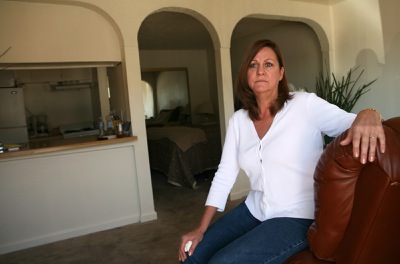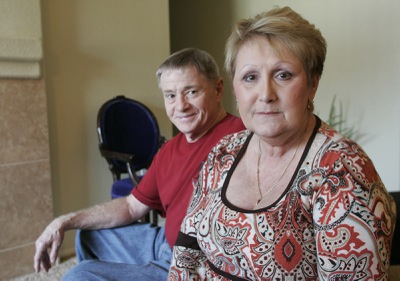Sunday, Nov. 30, 2008 | 2 a.m.
Once a waitress, now just waiting
Fifty-one-year-old Jennette Nelson has gone from two jobs to none, and from a nice apartment and pleasant evenings out on the town to a crummy efficiency motel where she’s waiting for her Chrysler Sebring to be repossessed.
Yep, she says, she should have saved money when she had it.
That would have been a couple of years ago, when Nelson was working two jobs as a food server, making between $600 and $900 a week depending on tips. She was working about 55 hours a week but there were bills to pay — including a $3,000 dental bill for a bridge and three pulled teeth. She also spent $5,000 on a down payment for the 2004 Sebring.
Still, she says, she enjoyed a degree of financial freedom. “I would go to the store and not have to count the dollar amount in my head.”
“In retrospect, I wish I saved that money,” she says. In a 12-month period, she put away just $1,800.
The dual jobs ultimately proved too much for Nelson. She kept the one at Denny’s, which promoted her to a $36,000-a-year position as a store manager. After a year, she quit because of the pressure, and took what she thought was a better job, as a waitress at an Original Pancake House.
It was there that the tanking economy caught up with her: Fourteen weeks into the new job, there was only enough business at the restaurant for her to work one or two days a week. She filed for unemployment because her wages were almost nil. Nelson’s boss apparently got wind of that and fired her Sept. 2.
This drove Nelson and her then-boyfriend from their apartment to the $200-a-week residence motel not far from the Strip. They married this month and paid $125 for everything, including the license, her dress and his suit.
These days, she visits the state JobConnect office on Maryland Parkway, which posts job listings, “looking for anything, server, cashier, warehouse job — anything.” She’s distributed her resume across the valley, at grocery stores, casinos, boutiques. The names of businesses, plus their phone numbers and the dates she’s visited them, are scribbled on a manila folder that holds her resumes.
Nelson is growing desperate because she’s three months behind on her $400-a-month car payments.
“I put my life savings in that car,” she says. “If I could just get one interview, I would ace it. But I haven’t had a single interview.”
Her husband, Rick Stewart, 50, earns about $750 a week stuffing vending machines in offices. It’s not enough to pay for staples, two cars and rent — or the cost to fix his impacted tooth.
“It’s just sad,” she says.
Nelson last week dipped into half of her remaining savings of about $70 to buy groceries for Thanksgiving. Six dollars went for a turkey.
No promising options for electrician
Randy Talbott, a traveling union electrician who recently helped wire the new Aliante Station, has been without a job before.
In 2003 and 2004, he worked a total of 10 weeks. But back then, he had thousands of dollars in savings. He cashed out a $40,000 investment in a West Palm Beach property and tapped into $25,000 in retirement funds to get by.
Now, the 61-year-old Indiana native has $2,600 in savings and $15,000 in credit card debt — and no job in a valley with thousands of unemployed contractors, engineers and electricians.
“My son asked me when I’m going to retire,” he says. “I said, ‘I’ll have to work until 10 months after I’m dead.’ ”
Talbott laughs. “What else can I do?”
His wife, Dayna, frets constantly. She sleeps just an hour or so a night.
“This is the worst feeling I’ve ever had,” says the 60-year-old, after delineating their expenses: the $900 rent for their Spartan apartment in the northern reaches of the valley; the $1,000 mortgage on their home in the Florida Panhandle; the $700 for the 2003 Buick Century and 2005 Cadillac CTS.
Randy Talbott hopes he’ll be called in for work in January, but expects it would be for a short project, maybe for a two-week convention. Between 300 and 500 union workers are ahead of him on the union’s wait list.
“I don’t want to go down to CityCenter,” he says of the massive $9.2 billion hotel and condo complex on the Strip. “People die there. They call it CityCemetery.”
But if tapped, he says, he would join that crew.
With other Strip and area projects suspended or slowed, he doesn’t know when or where he’ll be able to find long-term work. If he returns to his $170,000 home in Florida, he’ll be jobless, so he would default on his mortgage. He could relocate to the Midwest, where there are some jobs, but that would cost him at least $2,000 to move plus $300-a-week to rent another apartment for what he figures would be a two- to three-month gig.
The alternatives, he surmises, are worse than staying in Vegas, waiting for a call.
He and his wife of eight years refuse to sell their Florida home. He says he needs a permanent postal address, not a post office box, while he’s working in Michigan, Mississippi and Ohio, among other states where they have been this decade.
And the Florida home represents a refuge for Dayna Talbott, who misses the beach and her 28-year-old daughter. She said she ponders returning there “three times a week.” She has 14 boxes packed.
Come New Year’s, Randy Talbott could still be jobless with a wife 2,000 miles away.
There is no other option, he says. “That’s survival.”



Join the Discussion:
Check this out for a full explanation of our conversion to the LiveFyre commenting system and instructions on how to sign up for an account.
Full comments policy